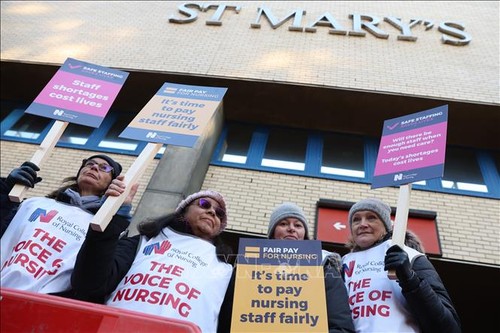 Healthcare go on strike beside St Mary Hospital in London, UK on December 15, 2022. (Photo: AFP/VNA) Healthcare go on strike beside St Mary Hospital in London, UK on December 15, 2022. (Photo: AFP/VNA) |
The healthcare systems of many European countries are facing protests by healthcare workers, who are demanding pay increases and better working conditions.
Large scale strikes and demonstrations in EU countries
France is facing a 3rd wave of strikes by healthcare workers from January 2-8. Doctors are demanding a doubling of their consultation fees, from 25 euros to 50 euros, and improved working conditions. Two large-scale doctors’ strikes in the first and last week of December interrupted medical services at nearly 30% of French clinics.
The French organization "Doctors for Tomorrow" estimates that more than 3,000 patients went untreated during the first strike and nearly 16,000 doctors participated in the second strike. Thousands of doctors across France went on strike to demand higher salaries in the face of rising prices.
Thousands of ambulance workers across England said they will stage two further strikes on January 11 and 23 in a dispute over pay and staffing. Late last month tens of thousands of ambulance service workers went on strike to pressure the government to deliver higher wages and improved working conditions. Over 100,000 nurses in England held strikes from December 15-22 with similar demands. These were the largest strikes ever in the 106-year history of the Royal Nurses Association. They said their salaries no longer guarantee them a secure life, as inflation has surpassed 10% for months, the highest inflation in more than four decades. This has led to skyrocketing food and energy bills.
Belgium has also seen strikes and demonstrations at many public hospitals in recent weeks. Hundreds of doctors and nurses carried banners demanding reduced work hours and an improved work environment. Social and healthcare organizations are planning a national demonstration on January 31.
Hundreds of Belgian healthcare workers went on strike and demonstrated in Berne and Geneva last November and December, asking for more holidays as overtime work has been at the "alarm" level.
 Traffic in Belgium is paralyzed by strikes. (photo: VNA) Traffic in Belgium is paralyzed by strikes. (photo: VNA) |
No effective measures
The strikes of healthcare staff are taking place with Europe facing overlapping epidemics of seasonal flu, bronchiolitis, and COVID-19. There has been no official response from the French government.
Prime Minister Élisabeth Borne said on Franceinfo TV on Tuesday that the strike of general practitioners is irresponsible. She recalled “significant increases” in salaries for two years, but acknowledged that this “didn’t fix everything” and that “there are other topics to discuss“, especially “organizational issues” and “work on the attractiveness of professions to reduce hardship“.
In England the government of Prime Minister Rishi Sunak said that nurses' salaries can only increase 4%, far less than the union’s demand of at least 7.5%. Sunak told Parliament last December that a raise would make soaring inflation worse. He did not rule out the government rewriting the pay review bodies’ remit for next year, meaning healthcare workers could get a bigger award in future.
Belgium’s national TV RTBF reported that Health Minister Frank Vandenbroucke claims to have paid 6 billion euros over the last 3 years, but healthcare strikes have continued.